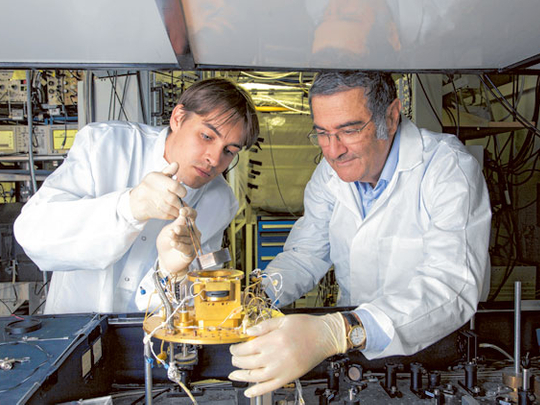
Stockholm: Serge Haroche of France and David Wineland of the US won the Nobel Prize on Tuesday for work in quantum physics that could one day open the way to revolutionary computers.
The pair were honoured for pioneering optical experiments in “measuring and manipulation of individual quantum systems,” the Nobel Physics jury said in its citation.
“Their groundbreaking methods have enabled this field of research to take the very first steps towards building a new type of super-fast computer based on quantum physics,” it said.
“Perhaps the quantum computer will change our everyday lives in this century in the same radical way as the classical computer did in the last century.”
The research has also led to the construction of extremely precise clocks that could become the future basis for a new standard of time, with more than hundred-fold greater precision than present-day caesium clocks, it said.
Haroche, 68, said the award was “fairly overwhelming.”
“I was in the street, passing near a bench, and was able to sit down immediately,” he told journalists via a live link to Stockholm.
“I was walking with my wife, when I saw the Swedish area code, I realized.”
The two scientists specialise in quantum entanglement, a phenomenon of particle physics that has been proven by experiments but remains poorly understood.
When two particles interact, they become “entangled,” which means one particle affects the other at a distance. The connection lasts long after they are separated.
In entanglement, particles also go into a state called superposition, which opens the way to a hoped-for supercomputers.
Today’s computers use a binary code, in which data is stored in a bit that could be either zero or 1.
But in superposition, a quantum bit, known as a qubit, could be either zero or one, or both zero and one at the same time.
This potentially offers a massive increase in data storage, greatly helping number-crunching tasks such as running climate-change models and breaking encrypted codes.
But many technical hurdles remain to be overcome.
Haroche and Wineland’s achievement has been to measure and control these very fragile quantum states, which were previously deemed inaccessible, so that the particles can be observed and counted, the jury said.
Haroche is a professor at College de France and Ecole Normale Superieure in Paris, while Wineland, 68, is a group leader at the National Institute of Standards and Technology and the University of Colorado in Boulder, Colorado.
On Monday, Shinya Yamanaka of Japan and John Gurdon of Britain won the Nobel Medicine Prize for work in cell programming, a frontier that has raised dreams of replacement tissue for people crippled by disease.
The Nobel prize announcements continue on Wednesday with the announcement of the chemistry prize, followed by the literature prize on Thursday.
Perhaps the most-watched award, for peace, will be announced on Friday and the economics prize will wind up the Nobel season on October 15.
The laureates will receive their prizes at formal ceremonies in Stockholm and Oslo on December 10, the anniversary of prize founder Alfred Nobel’s death in 1896.
The Nobel Foundation has slashed its prize sum to eight million Swedish kronor ($1.2 million, €930,000, Dh4.4 million) per award, from the 10 million kronor awarded since 2001, due to the economic crisis.
–












